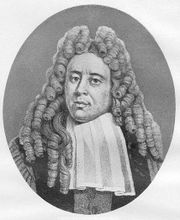
Perizonius
Encyclopedia

Dutch people
The Dutch people are an ethnic group native to the Netherlands. They share a common culture and speak the Dutch language. Dutch people and their descendants are found in migrant communities worldwide, notably in Suriname, Chile, Brazil, Canada, Australia, South Africa, New Zealand, and the United...
classical scholar, who was born at Appingedam
Appingedam
- Population centres :Appingedam, Garreweer, Jukwerd, Laskwerd, Marsum, Oling, Opwierde, Solwerd, Tjamsweer.- Appingedam :Little is known about the exact age and origin of the name of Appingedam. It came into existence on the banks of the Delf, the present Damsterdiep, around 1200...
in Groningen
Groningen (province)
Groningen [] is the northeasternmost province of the Netherlands. In the east it borders the German state of Niedersachsen , in the south Drenthe, in the west Friesland and in the north the Wadden Sea...
.
He was the son of Anton Perizonius (1626–1672), the author of a once well-known treatise, De ratione studii theologici. Having studied at the University of Utrecht
Utrecht University
Utrecht University is a university in Utrecht, Netherlands. It is one of the oldest universities in the Netherlands and one of the largest in Europe. Established March 26, 1636, it had an enrollment of 29,082 students in 2008, and employed 8,614 faculty and staff, 570 of which are full professors....
, he was appointed in 1682 to the chair of eloquence and history at Franeker
Franeker
Franeker is one of the eleven historical cities of Friesland and capital of the municipality of Franekeradeel. It is located about 20 km west of Leeuwarden on the Van Harinxma Canal. As of 1 January 2006, it had 12,996 inhabitants. The city is famous for the Eisinga Planetarium from around...
through the influence of J. G. Graevius
Johann Georg Graevius
Johann Georg Graevius was a German classical scholar and critic. He was born at Naumburg....
and Nikolaes Heinsius
Nikolaes Heinsius the Elder
Nikolaes Heinsius the Elder , Dutch classical scholar and poet, son of Daniel Heinsius, was born at Leiden.His boyish Latin poem Breda expugnata was printed in 1637, and attracted much attention. In 1642 he began his wanderings with a visit to England in search of manuscripts of the classics; but...
. In 1693 he was promoted to the corresponding chair at Leiden, where he died on 6 April 1715.
The numerous works of Perizonius entitle him to a high place among the scholars of his age. Special interest attaches to his edition of the Minerva sive de causis linguae latinae (Salamanca: Renaut, 1587) of Francisco Sánchez de las Brozas
Francisco Sánchez de las Brozas
Francisco Sánchez de las Brozas , also known as El Brocense, and in Latin as Franciscus Sanctius Brocensis, was a famous Spanish philologist and humanist.- Biography :...
or El Brocense (ed. C. L. Bauer, 1793–1801), one of the last developments of the study of Latin grammar
Latin grammar
The grammar of Latin, like that of other ancient Indo-European languages, is highly inflected; consequently, it allows for a large degree of flexibility in choosing word order...
in its pre-scientific stage, when the phenomena of language were still regarded as for the most part disconnected, conventional or fortuitous.
Mention should also be made of his Animadversiones historicae (1685), which may be said to have laid the foundations of historical criticism, and of his treatises on the Roman republic
Roman Republic
The Roman Republic was the period of the ancient Roman civilization where the government operated as a republic. It began with the overthrow of the Roman monarchy, traditionally dated around 508 BC, and its replacement by a government headed by two consuls, elected annually by the citizens and...
, alluded to by Niebuhr
Barthold Georg Niebuhr
Barthold Georg Niebuhr was a Danish-German statesman and historian who became Germany's leading historian of Ancient Rome and a founding father of modern scholarly historiography. Classical Rome caught the admiration of German thinkers...
as marking the beginning of the new era of historical study with which his own name is associated.

